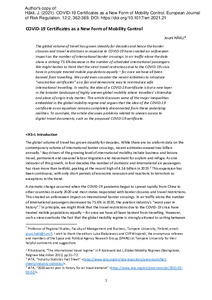COVID-19 Certificates as a New Form of Mobility Control
Häkli, Jouni (2021-07-05)
Avaa tiedosto
Lataukset:
Häkli, Jouni
05.07.2021
This publication is copyrighted. You may download, display and print it for Your own personal use. Commercial use is prohibited
Julkaisun pysyvä osoite on
https://urn.fi/URN:NBN:fi:tuni-202209287323
https://urn.fi/URN:NBN:fi:tuni-202209287323
Kuvaus
Peer reviewed
Tiivistelmä
The global volume of travel has grown steadily for decades and hence the border closures and travel restrictions in response to COVID-19 have created an unforeseen impact on the number of international border crossings. In air traffic alone the data show a striking 75.6% decrease in the number of scheduled international passengers. We might hasten to think that the strict travel restrictions due to the COVID-19 crisis have in principle treated mobile populations equally-for once we have all been banned from travelling. We could even consider the recent initiatives to introduce "vaccination certificates"as a fair and democratic way to reintroduce safe international travelling. In reality, the idea of a COVID-19 certificate is but a new layer in the broader landscape of highly uneven global mobility where travellers' citizenship and place of origin truly matter. This article discusses some of the major inequalities embedded in the global mobility regime and argues that the idea of the COVID-19 certificate as an equaliser remains completely disconnected from these underlying realities. To conclude, the article discusses problems related to uneven access to digital travel documents, such as the proposed COVID-19 certificate.
Kokoelmat
- TUNICRIS-julkaisut [16977]
